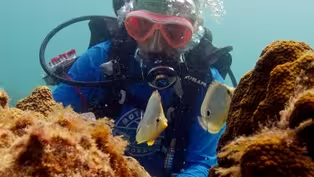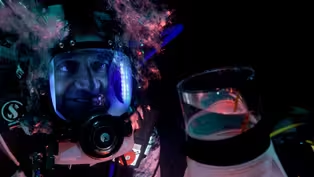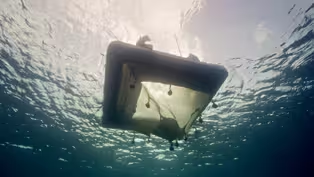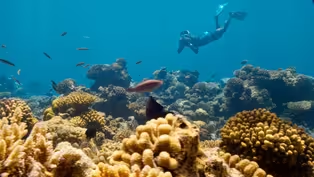
Extended Trailer
Preview: Season 3 Episode 1 | 3m 8sVideo has Closed Captions
Dr M. Sanjayan investigates the urgent efforts to help coral reefs survive climate change.
In the third year of this 7-year project examining the issues facing the planet’s most threatened ecosystems, Dr. M. Sanjayan visits the Maldives to take an in-depth look at coral reefs and the urgent efforts to help them survive climate change.
Problems playing video? | Closed Captioning Feedback
Problems playing video? | Closed Captioning Feedback

Extended Trailer
Preview: Season 3 Episode 1 | 3m 8sVideo has Closed Captions
In the third year of this 7-year project examining the issues facing the planet’s most threatened ecosystems, Dr. M. Sanjayan visits the Maldives to take an in-depth look at coral reefs and the urgent efforts to help them survive climate change.
Problems playing video? | Closed Captioning Feedback
How to Watch Changing Planet
Changing Planet is available to stream on pbs.org and the free PBS App, available on iPhone, Apple TV, Android TV, Android smartphones, Amazon Fire TV, Amazon Fire Tablet, Roku, Samsung Smart TV, and Vizio.
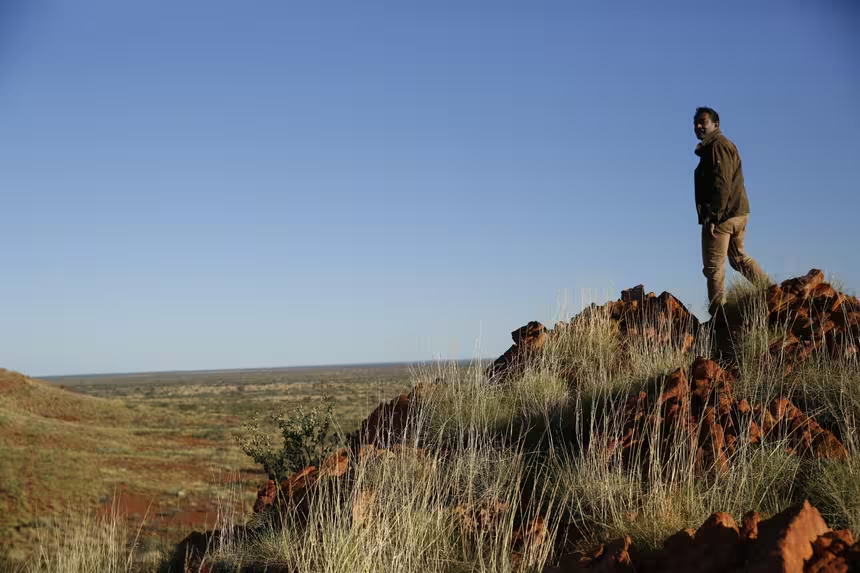
Dr. M. Sanjayan On Our Climate Future
Dr. M. Sanjayan discusses how he stays optimistic about our climate future, our role in climate change, his climate heroes, and more.Providing Support for PBS.org
Learn Moreabout PBS online sponsorshipWhen you think about all the habitat types on Earth that are sensitive to climate change.
Obviously, ice comes to mind.
But the other thing that comes to mind is coral reefs.
Healthy reefs are vital for marine wildlife.
Over a million species depend on them to survive.
From the tiniest fish, to flocks of seabirds and gigantic manta rays.
Around the world, 500 million people rely on reefs for food and to protect coastlines from storms and rising sea levels.
They're also crucial for humanity as a whole.
Coral reefs are the cornerstone of a well-functioning ocean ecosystem.
They create habitat for seagrass beds and mangroves, which in turn absorb carbon and store it, helping to stabilize the climate, but the future of coral reefs is hanging in the balance.
They are really sensitive to lots of things sea water rise, sea water temperature, acidification of the oceans, pollution.
...and that's why they are really one of the most endangered habitats on earth.
We are at a tipping point.
Half of all coral reefs have already been lost or severely damaged and experts predict that without action, nearly all reefs could die off in the next few decades.
Now, groundbreaking scientific collaborations are offering a beacon of hope.
If they work.
For the past two years, this ambitious project has been following the pioneering work of scientists and conservationists at key places around the world.
But this year, I'm focusing on a habitat that's facing the most urgent threat, coral reefs.
I'm taking a special in-depth look at the crucial efforts to save coral and innovative techniques that could bring reefs back to life.
Reefs around the world are literally collapsing because they don't have enough corals on them.
Everything we do today has to focus on saving what we have and rebuilding what we've lost.
My search for practical, scalable solutions has brought me here to the Maldives because this is the epicenter of climate change, coral reefs and practical science.
Battling Coral Disease: Treatments Below the Waves
Video has Closed Captions
Clip: S3 Ep1 | 3m 19s | Discover the non-antibiotic solutions used to combat stony coral tissue loss disease. (3m 19s)
Capturing Life's Genesis: Coral Spawn Collection
Video has Closed Captions
Clip: S3 Ep1 | 3m 52s | M. Sanjayan witnesses the ingenious net capturing of coral spawn. (3m 52s)
Floaty Boat: Precise Delivery for Coral Larvae
Video has Closed Captions
Clip: S3 Ep1 | 4m 49s | Meet Floaty Boat, the high-tech vessel ensuring precise coral larvae restoration. (4m 49s)
Reef Nursery Symphony: Soundscaping for Coral Restoration
Video has Closed Captions
Clip: S3 Ep1 | 4m 36s | The innovative mission to restore coral reefs with a groundbreaking musical twist. (4m 36s)
Video has Closed Captions
Preview: S3 Ep1 | 30s | Dr M. Sanjayan investigates the urgent efforts to help coral reefs survive climate change. (30s)
Providing Support for PBS.org
Learn Moreabout PBS online sponsorship
- Science and Nature

Explore scientific discoveries on television's most acclaimed science documentary series.

- Science and Nature

Follow lions, leopards and cheetahs day and night In Botswana’s wild Okavango Delta.












Support for PBS provided by:
